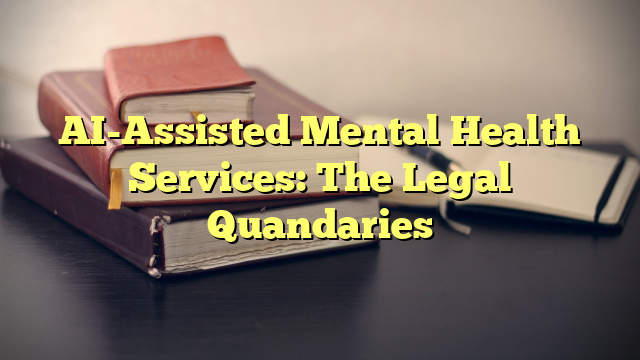Table of Contents
Legal Issues Related to Using AI in Healthcare
AI-assisted mental health services have gained popularity in recent years due to their potential to improve access and affordability of care. However, their use raises several legal concerns:
- Privacy and data protection: AI systems collect and analyze sensitive patient data, which must be handled in compliance with privacy laws.
- Liability: Determining responsibility for errors or harm caused by AI algorithms is complex, as it involves multiple parties, including developers, healthcare providers, and users.
- Informed consent: Patients must be adequately informed about the use of AI in their treatment and understand the potential risks and benefits.
- Regulatory compliance: AI-assisted mental health services may need to meet specific regulatory requirements, such as obtaining appropriate certifications or licenses.
Legal Issues Surrounding AI
AI technology is being used in various industries, including healthcare, and presents unique legal challenges:
- Intellectual property: Determining ownership and protection of AI-generated inventions and creative works can be complex.
- Algorithmic bias and discrimination: AI systems can perpetuate biases and discriminate against certain individuals or groups, raising concerns about fairness and equality.
- Accountability and transparency: The lack of transparency in AI decision-making processes can make it difficult to hold AI systems accountable for their actions.
- Regulation and liability: The legal framework for AI is still evolving, and there is a need to establish clear regulations and liability standards for AI technologies.
AI Used in Legal Services
AI technology is also being utilized in the legal field, with applications such as:
- Legal research: AI algorithms can analyze vast amounts of legal data and assist in legal research and case preparation.
- Contract analysis: AI can review and analyze contracts, identifying potential risks and inconsistencies.
- Document automation: AI-powered tools can automate the creation and review of legal documents, improving efficiency.
- Predictive analytics: AI algorithms can analyze historical legal data to predict case outcomes and assist in decision-making.
Ethical Issues with AI Healthcare
While AI-assisted mental health services offer potential benefits, they also raise ethical concerns:
- Privacy and confidentiality: AI systems handle sensitive patient data, and ensuring privacy and confidentiality is crucial.
- Equity and access: AI technologies should not exacerbate existing healthcare disparities and should be accessible to all individuals, regardless of socioeconomic status.
- Transparency and explainability: AI algorithms should be transparent and explainable to ensure trust and accountability.
- Human oversight: While AI can augment mental health services, human professionals should retain ultimate responsibility and oversight.

